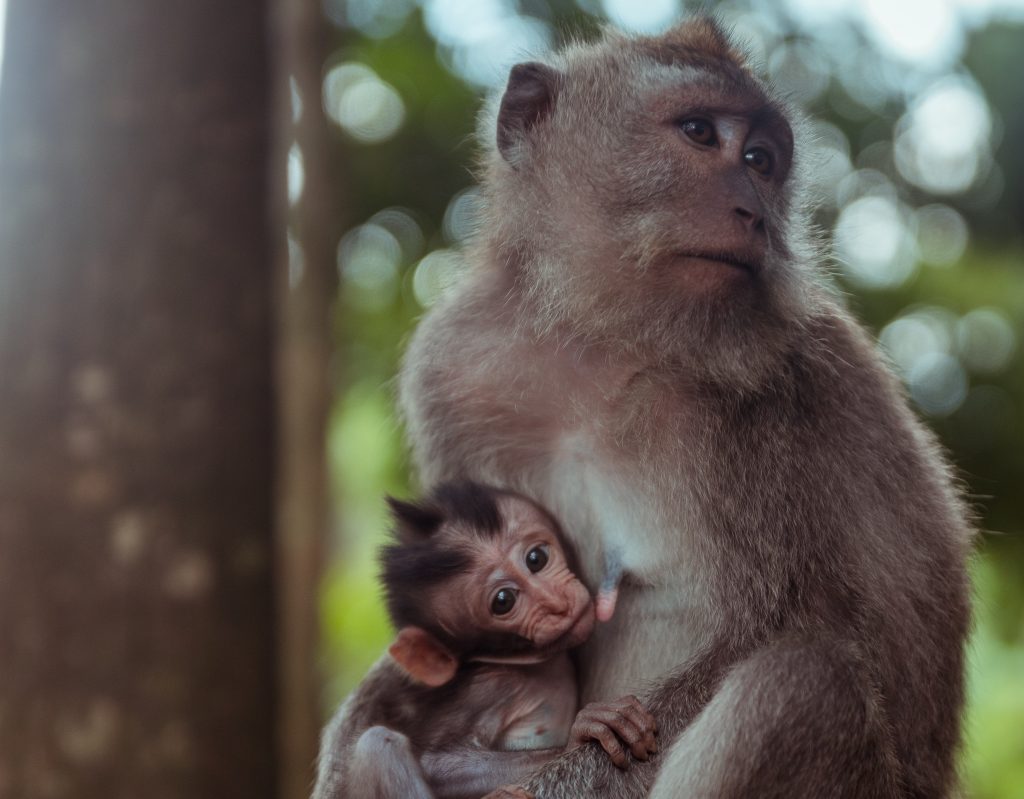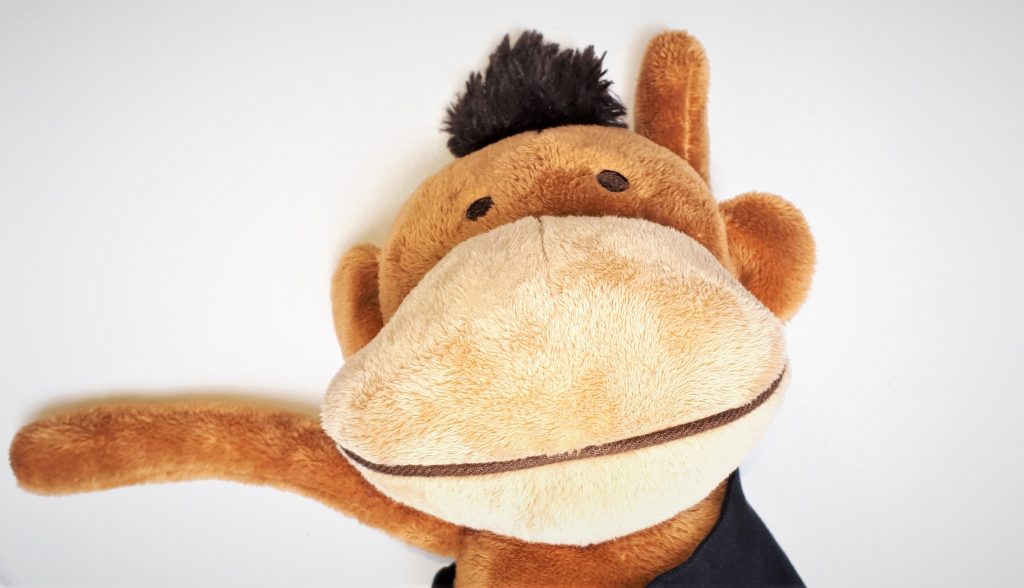Spreekwoorden en Uitdrukkingen (Sayings and Expressions) 10 – Monkeys! Posted by Sten on Sep 2, 2019 in Culture, Dutch Language, Dutch Vocabulary
Yes, really. Apen (monkeys). The Netherlands may one of the least tropical landen (countries) you can think of. Yes, we have the infamous broodjeaapverhalen, but we also have plenty of spreekwoorden (sayings) and uitdrukkingen (expressions) that contain the mensachtige (human-like) primates. Let’s have a look at two today, starting, as always, with the spreekwoord.
For other sayings and expressions in this series, click here.
Aap wat heb je mooie jongen
You’re quite the goody two-shoes
literally: Monkey how beautiful are your infants
Monkey! Your infants are so mooi (beautiful)! Of course, this is a sarcastic one. This weird spreekwoord is something you’d say to somebody who is perhaps a bit overly trots (proud) of something. It can also mean that somebody is excessively lief en aardig (nice and sweet) to get something done. In that case, you can also say (if you want to talk about it, instead of telling somebody in their face): ze spelen aap wat heb je mooie jongen (they play monkey how beautiful are your infants). The closest English equivalent I could find is goody two-shoes.
To be fair, I have neither heard the Dutch nor the English one in the wild. Looking up the Dutch version, I mostly find references in dictionaries and similar websites, no actual use cases. It is therefore also difficult to figure out where this spreekwoord comes from! I have my own theory, but take it with a metric ton of salt, please.
Voor aap staan (“to stand as monkey”) is an uitdrukking that means that you are belachelijk (ridiculous) in het openbaar (in public). If you stroll along the street, minding your own business, when suddenly you slip on a non-existing banana peel, for example (let’s be honest here, this happened to all of us). When you tell somebody aap wat heb je mooie ogen, you expose them, you show that you know what they are up to. Yes, you are making them a little belachelijk. The second part, about the monkey’s infants, may be about what they are proud of. People are often proud of their nageslacht (offspring), and it might just be something they do not shy away from showing off. By making a sarcastic statement about how beautiful their jongen are, you specify what you are making ridiculous: it is that pride, that excessive showing-off. Again, huge bucket of salt.
Similarly, I am going to have to guess on the usage of this spreekwoord. I can imagine that it would be used in the following way:
– Waarom bood Jan je nou aan met hem op het IJsselmeer te gaan zeilen?
Hij wil graag een rit maken in mijn oude Ferrari, en hij hoopt dat ik hem dat als dank aanbiedt. Hij speelt aap wat heb je mooie ogen.
(- So, why did Jan offer you to go sailing with him on the IJsselmeer?
He wants to take a ride in my old Ferrari, and he hopes that I offer him that as a thank you. He plays monkey how beautiful are your eyes.)
As you can see, it is not the nicest thing to say. Perhaps that is why it’s been abandoned by all but a few Dutch uncles. As you may imagine, this is really a rather informal spreekwoord.
You may have very good eyes and noticed something odd. A komma (comma) is missing after the aap! Normally, before and after an aanspreking (address), you have to use a komma. And so, grammatically correct would be aap, wat heb je mooie ogen. I don’t know why it was omitted here. The only explanation I could imagine is that this spreekwoord is a product of everyday language where the separation between aap and wat heb je mooie ogen is not made. In the case of hij speelt aap wat heb je mooie ogen, things look even crazier. But it does show that aap really is not addressing anybody here, even if it should.
Let’s move on from all this weirdness to a well-established and often used uitdrukking!
De aap komt uit de mouw
The cat is out of the bag
Literally: the monkey comes out of the sleeve
You have definitely heard the English version before, and learning Dutch, you will inevitably come across de aap komt uit de mouw. Used when it suddenly becomes clear what’s going on, it is a much used uitdrukking in the Dutch language. But where does it come from?
I have some answers for you now. Back in the day, artists would have an aap hidden in their mouw (sleeve). At some moment, it was to suddenly appear. Though there is another explanation, offered by F.A. Stoett. He wrote that aap does not refer to our furry friends, but to an apenaard, an old Dutch word I have never heard of that means “kwajongensachtig karakter” (rascal-like character). Keeping something in de mouw (in the sleeve) would simply be a metaphor for hiding that character. When it would come out, you would suddenly see their real character. This could make sense too, since such a sudden aap uit de mouw is often unintended and may not be positive for all involved.
As further evidence of how much this uitdrukking is used, there is a variation on nu komt de aap uit de mouw: ze hebben de aap in de mouw (they have the monkey in the sleeve). This means that you have a hunch that they are up to something, and you expect the monkey to come out at some point.
Let’s take a look at a real-case example. The European Union records many documents and proceedings in many, if not all, 23 official languages of the Union. De aap komt uit de mouw is used a lot here, actually. Nirj Deva, former member of the European Parliament from the United Kingdom, said in 2008 in English:
The cat is out of the bag, and we have thrown the baby out with the bath-water.
This was then translated into:
De aap is uit de mouw, en we hebben het kind met het badwater weggegooid.
Fun, right?!
So as you can see, de aap is uit de mouw can be used in formal to informal settings.
Have you heard of these two before? Or have you used them before? How do you say this in your language?

Build vocabulary, practice pronunciation, and more with Transparent Language Online. Available anytime, anywhere, on any device.






Comments:
Gre:
I have never heard either expression from my mother, who came to the US after World War II.
She used to affectionately call my sister and me kleine apekops (sp?) when we were younger.
Speaking of apen in the Nederlands, have you ever been to Apenheul in Apeldoorn?
Sten:
@Gre apekop! Yes. That’s a thing, I will think about that for a future post! 🙂
And yes, Apenheul is amazing! Have you been there?
Gre:
@Sten Yes. I was there about 20 years ago with my family. Gezellige voor de apen.
Sten:
@Gre Very nice. Gezellig indeed! 🙂
marion fitzsimons:
Another one is “Al heeft de aap een gouden ring, het is en blijft een lelijk ding”
It isn’t a flattering thing to say, often used when someone is boasting or showing off to much.
I have never heard it used to someone directly. Very much one for commenting behind someone’s back.
pieter hoeberichts:
for an apple and an egg: very cheap.